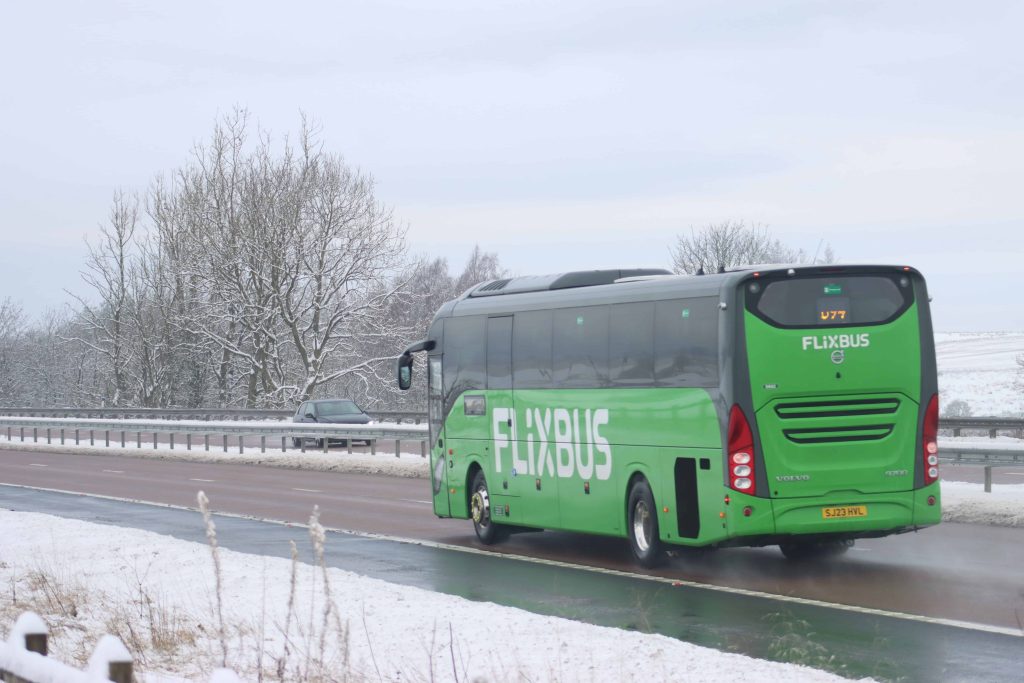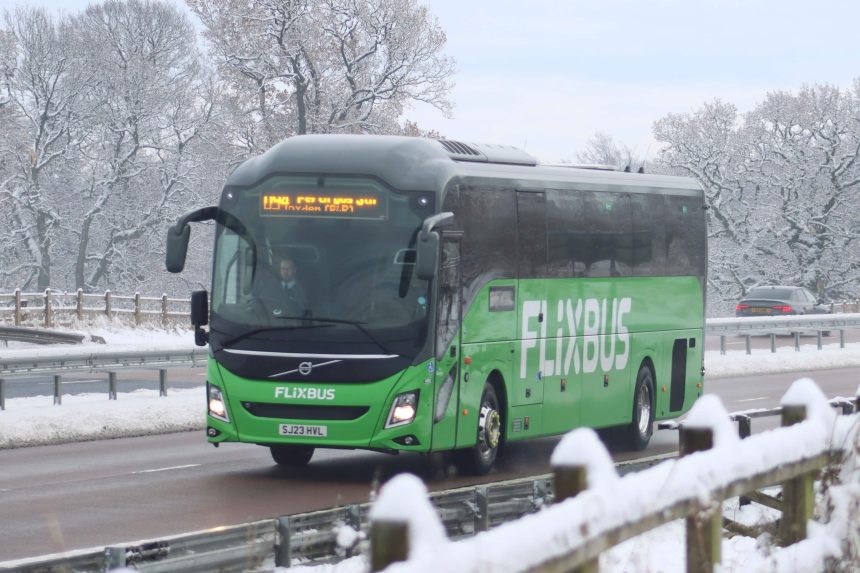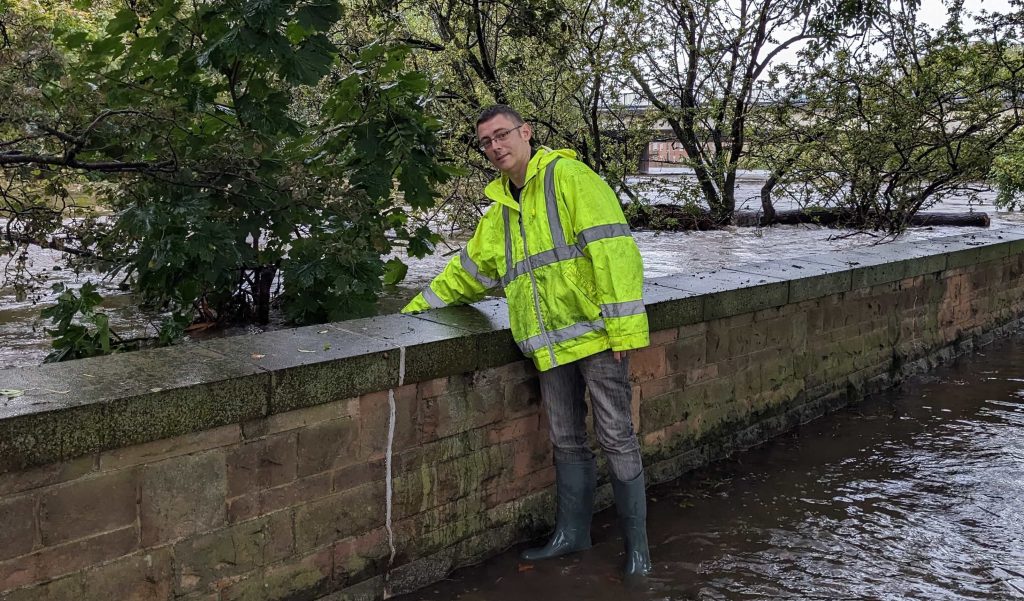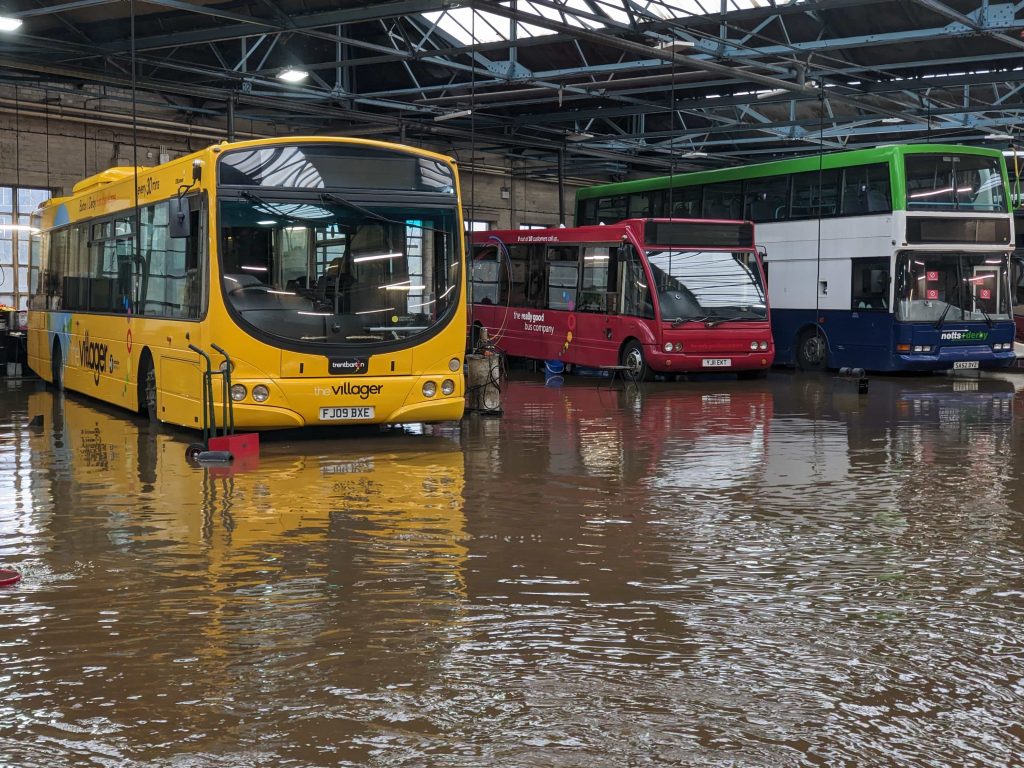Extreme weather has disrupted travel in the second half of 2023 — but coach and bus shows how to keep the nation moving
At the time of writing, yet more heavy rain is forecast as the UK Met Office gives away yellow warnings for named storms in north-east and south-west Scotland and the North of England.
Storm Elin stranded motorists and disrupted rail at the beginning of December, only to be followed by Storm Fergus shortly after, alongside 50 flood warnings in England, five flood alerts in Wales and twelve alerts and warnings in Scotland.
It continues a theme of extreme weather that has been prevalent in the second half of 2023. Despite that, it has been business as usual for Britain’s coach and bus operators, with coaches coming to the rescue of passengers stranded by other modes, and bus operators taking measures to keep networks afloat.
routeone speaks with some of those on the ground to see how they prepare for extreme weather events.
FlixBus to the rescue
Within the UK, especially in Scotland and in the North of England, FlixBus operator partners dealt with snow and icy road conditions across 2-3 December. The weekend saw weather warnings for snow and ice covering the east coast of England, Northumberland, Kent, and the south-west and north of Scotland.
Undeterred, FlixBus operators kept the company’s scheduled coach network functioning. The company reports that 95% of all trips in affected regions took place amid the disruption, demonstrating the reliability of coaches as a mode of transport.
Not only that, FlixBus came to the rescue of passengers stranded by other modes. Andre Schwammlein, Founder and CEO of Flix, thanked FlixBus partners and drivers operating in Scotland and Germany, where rail and air travel disruption affected passengers – commenting that the rescue was an example of the power and resilience of coach travel.
Hayley Russell, FlixBus UK Operations Team Lead, says the company’s preparedness comes from its experience as a global operator in 42 markets across four continents. “We have built our network to adapt to every kind of weather,” she says. “Our mission is to deliver smart, green transport to everyone everywhere, and we are committed to helping passengers travel to their destination safely.”
When asked how FlixBus ensures the safety for its drivers and passengers, Hayley says: “The safety of our passengers and drivers is of course our number one priority, so we make any decisions with this front of mind. To mitigate risks, our traffic control and operations teams continually monitor for weather alerts and stay in dialogue with our partners.”
The FlixBus partner operator most affected by this year’s inclement weather was McGill’s. Dedicated FlixBus Manager Billy Dunsmore led the operator’s team through the challenge, with Hayley praising him for remaining calm, pragmatic, and determined to continue services as far as was possible.
“Yellow warnings of snow were given well in advance which meant we had plenty of time to plan with the team at McGill’s, who informed us that local authorities had prepared the roads for the weather,” she adds. “We’re proud that FlixBus UK services continued without any cancellations due to weather, allowing us to offer transport options to passengers who were left without train connections.”

Dialogue and on-ground knowledge
When FlixBus becomes aware of potentially impactful weather, the business contacts its partner operators and drivers that might be affected. FlixBus trusts in their local on-the-ground knowledge and together action is agreed on whether vehicles can operate or changes to schedules are necessary. “It’s a dynamic and ongoing process, using up-to-date information to continually evaluate decisions,” Hayley says.
If external organisations should close roads, and FlixBus judges that it should not or cannot deliver services on the grounds that it is unsafe to do so, the operator uses technology to remove tickets from sale and notify passengers by text and email.
“As a tech company, we have built software which allows us to notify all drivers in an area — which is what we did in Munich — with safety information. The FlixBus Driver App also allows us to track the exact location of vehicles and drivers, meaning we are able to monitor journeys and communicate delays to our entire network.
“All drivers complete training on our dedicated learning platform FlixUni, which includes training on how to handle challenging conditions on the road. Good practice includes driving more slowly, allowing more time for stopping, and taking particular care on motorways which are unprotected by buildings and hills – as well as keeping passengers informed en route.”
In addition to that, in the case of an emergency, Hayley points out that each country has a Special Assistance Team (SAT), that has been trained to support on the ground, should it be needed.
Storm Babet, which severely impacted Scotland in October, presents another scenario in which FlixBus’s tight approach to communication and operation management minimised disruption.
“Northern Scotland was severely flooded, with roads closed, so McGill’s advised operating in Aberdeen would be unsafe,” explains Hayley. “However, FlixBus services continued in all other areas of the country, including services to and from Dundee, where many other transport options had been cancelled.
“During Storm Babet, we anticipated a rise in last-minute bookings due to other services being cancelled. We provided guidance for our station agents at London Victoria Coach Station, as well as our traffic control, about remaining proactive and providing additional support for interconnections due to the weather.
“Our technology allows us to stay agile, communicative and react quickly to changing scenarios. We continue to develop solutions that keep us on the front foot, while safely transporting passengers to their destination.”
Rising above the tide
For some bus companies, dealing with flooding is par for the course – particularly when historic depots are situated alongside rivers notorious for bursting their banks.
But sometimes the waters rise higher than usual. Such was the case for Trentbarton when in October it found its historic riverfront Meadow Road depot in Derby flooded worse than ever before by the Derwent.
Trentbarton Group Engineering Director John Bickerton (pictured) explains that flood preparation began on 20 October after the first warnings were received. By 21 October parts of the building were submerged in nine inches [23cm] of water, and by 22 October clean-up was underway.
Trentbarton was fortunate insofar as it was able to move most of its 100-strong fleet based at Meadow Road to a nearby site on Stores Road, a mothballed Brownfield site that has been considered as a new location pending news on the operator’s latest ZEBRA bid. Vehicles that couldn’t be moved were placed near higher ground within the depot.
While there has been flood defence work undertaken in Derby, this year saw the highest flood waters the city has ever seen, according to John. Measures taken were quickly overwhelmed.
At the bottom end of the site there was quite a flow across the parking area,” John says. “That was draining down into the underpass behind which was about 18 feet [5.5m] deep in the middle. That’s normally below the river.”
Thankfully, the vehicles left within the depot were safe, and damage to the depot was minimal. A smoke and brake tester needed replacement, but the biggest cost in terms of cleanup was in staff hours. John, however, says the team at Trentbarton was exemplary.
“The team were amazing in terms of their resilience to just getting on with things,” he says. “Keep calm and carry on is absolutely what I saw. That is always good to see — when you have an empowered team who are just getting on with it, and don’t need supervision.”
Prior planning helps to give staff that ability, but trust plays a large part. “If staff have the tools to make sensible decisions, and they are trusted to make those decisions, then they can get on with the job.”
The impact of the flooding was not, of course, limited to the depot. A wider impact came from the flooded road network, which consequently disrupted the bus network. Empowerment plays a role there, too.
“Police and emergency services were good at clearing roads but in many cases we couldn’t get through because of abandoned cars,” John says. “It’s a real balance to try and take the right risks and empower that driver team to make the right choice for them on the day. That means not reacting when somebody says they don’t want to drive through the flood water. It also means not reacting when someone does drive through flood water, and potentially causes damage to a vehicle. There is only one person on the ground looking at a particular piece of road and making a decision, and it’s always about supporting those people.”
Communication, co-operation
For John, the exercise has shown the importance of communication and co-operation. “The preparation that we did in terms of moving to Stores Road as a site, we can do better next time. We had a pretty good response in terms of clearing up the depot, and we can probably book some of that stuff ahead of the water rising, so that we are more quickly back on our feet.
Derby City Council is now moving ahead with its further flood alleviation work and is right next door to our site. Working together in simple ways is easy to do, and it takes a lot of operational headache out of that for the council. It’s in all of our interests to make the site resilient to flooding.”
With Trentbarton working together with Derby City Council on the flood alleviation work, John is confident that this will avoid the level of flooding seen this year. “I think the council has learned lessons. But its team was fantastic, and getting communication with our operations team was key to ensure we could get back into our site as early as possible.
“My greatest recognition goes to our operations and engineering teams for getting on and doing the job in far from ideal conditions. It would have been quite reasonable for people to say they couldn’t work like that, and go home. But that isn’t the right answer for the customer. We got the right result and did the best we could for our customers out of it, and kept Derby moving.”



























